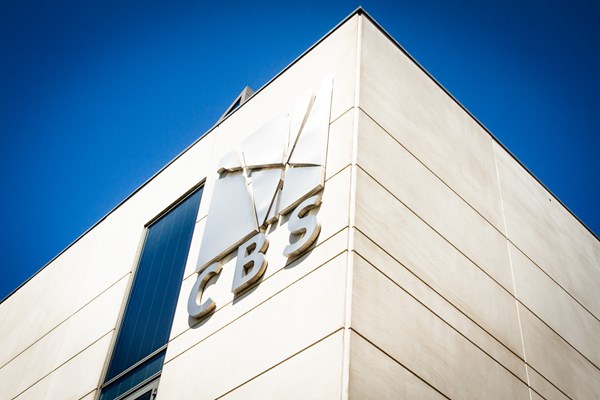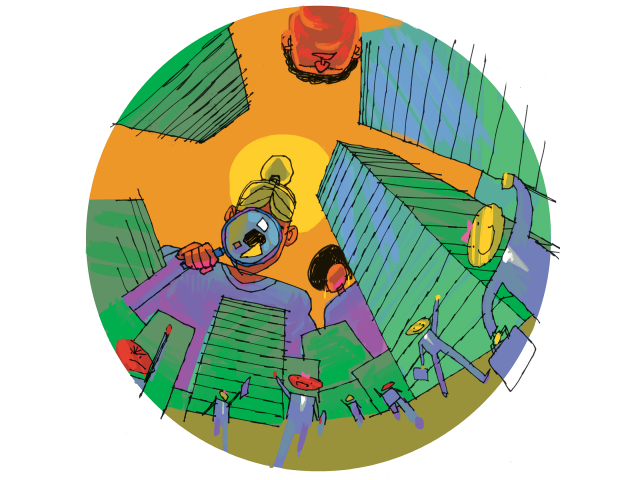CBS establishes promotion track for associate professors: “A clear career path allows for risk taking and the pursuit of big questions”

(Photo: Anna Holte)
Associate professors can now follow a promotion track towards a full professorship. According to the Dean of Research, the newly established promotion track will create transparency and higher-quality research. A senior shop steward asks for a broader discussion of other career paths for associate professors not planning to become professors.
Associate professors at CBS, whose long-term goal is to obtain a full professorship, can now put their dreams on track.
After a Ministerial order of December 11, 2019 on Job Structure for Academic Staff at universities, promotion tracks can be established for associate professors, while the position of Professor MSO is being phased out.
“We are happy to have this opportunity, as it addresses a real concern about the difficulty of planning a career. So it clearly meets a need,” says Søren Hvidkjær, the Dean of Research.
Since the Ministerial Order from the Ministry of Higher Education and Science, a working group with representatives from the Academic Council, the General Consultation Committee, Head of Departments, CBS-Wide Appointment Committee (CWAC) and the Dean of Research have been working on drafting a promotion track for associate professors at CBS, and the draft has just been accepted by HSU and the Academic Council.
Søren Hvidkjær explains that previously all positions for professorships had to be posted, meaning that everyone could apply.
“And this is unlike other types of jobs where you can promote employees. We have not had that option. Of course, posting all vacant positions has a high degree of transparency, but it makes career planning harder. We may have an excellent associate professor we would like to promote, but when the position has to be posted, it’s possible that an even stronger candidate will get it,” he says and continues:
“From an associate professor’s perspective, this adds uncertainty to the process, whereas the promotion track creates a clear path. And from the perspective of CBS, the current system adds budgetary uncertainty because it mixes the promotion and allocation decisions. The promotion track allows a separation of the two.”
Ole Helmersen, Senior Shop Steward, finds it sensible to introduce a promotion track, as it clarifies what it will take to become a professor, while also responding to the criticism raised in the latest job satisfaction survey from 2019. Here, VIP personnel drew attention to a lack of transparency in relation to career opportunities at CBS.
“Some will say that the process is somewhat bureaucratic, but that’s how it is when only a limited number of professorships are available. But the big advantage with the promotion track is that the process is now described. This was not the case with the MSO position, which was less formal,” says Ole Helmersen and continues:
“We did not have an exact procedure in writing on how to become a professor MSO, which made it hard to explain why associate professor X could obtain an MSO position while associate professor Y could not. Now, that’s clearly explained.”
All associate professors can apply for the promotion track, which runs over the course of maximum eight years on average, and will be implemented during the fall.
Extension of tenure track
The new promotion track resembles the already existing tenure track, which permits the recruitment of assistant professors aiming at becoming associate professors. According to Søren Hvidkjær, the tenure track is an important tool for attracting international faculty.
“Internationally, the tenure track is widely used, so having one at CBS was essential if we wanted to operate in an international market. With the promotion track, we take on the logic further up the career path, as it is a means of creating attractive positions for senior faculty,” he says.
By having a promotion track, Søren Hvidkjær hopes CBS can attract and retain research talent.
“The more attractive positions we can offer, the more accomplished and talented researchers we can attract, and this is reflected in the research. When doing research, long-term thinking is crucial, and here a clear career path allows for risk taking and the pursuit of big questions that may not pan out in the short run,” he says.
Don’t you risk that the transparency of what positions are available will disappear with the promotion track?
“I believe that we have created a model with a high degree of transparency, and the allocation of positions follow our regular procedures. Having said that, it’s important that not all professorships are filled via this channel, and we will continue to have professorships that are open to everyone. This is something we will monitor and adjust during the implementation phase,” says Søren Hvidkjær.
Regarding how CBS is sure to find the best candidate if the position is not posted, Søren Hvidkjær answers:
“We wish to attract the strongest candidates, not only at professor level, but also at associate level. We believe this model will help ensure that CBS as a whole attracts such candidates.”
By the end of the promotion track, the associate professor can request assessment for the professorship. However, that goal is not guaranteed. So why might people be tempted to apply for the promotion track, if a professorship is not guaranteed?
“It is attractive because if the associate professor qualifies for the professorship at the end of the promotion track period, then she or he is guaranteed the promotion. There is no such guarantee with the regular associate professorships,” says Søren Hvidkjær.
Everyone can apply, but
At the moment, Søren Hvidkjær cannot put an exact number on how many positions will be open in the promotion track, as this must be further discussed.
“The job structure reserves the promotion track is for especially talented associate professors. This includes of course those with both the ambition and clear potential to become a professor, so of course, that limits how many will be accepted into the program. But clearly, we will have to evaluate the promotion track on an ongoing basis depending on the number and quality of the expressions of interest from associate professors,” he says.
Ole Helmersen wants to avoid using the word ‘talented’, as it indirectly says that some researchers are not talented. However, it is indisputable that the associate professor must live up to certain criteria to be considered for a full professorship, he says.
“Some associate professors just make better research than others and thereby have a better position for being considered for the promotion track. Some want to become a professor, while others don’t,” he says.
The document, which describes the process behind entering into the new promotion track, says that “entry into the track depends on the strategic considerations of the department and of CBS”. And this concerns Ole Helmersen.
“Let’s say an associate professor is planning to apply for entry to the promotion track in three years based on the strategic considerations expressed at that point. But what if the strategic considerations change? We cannot guarantee they won’t, and it’s a Senior Management decision, but I want to appeal to Senior Management to make it possible for researchers to plan long term, so they are not caught up,” he says.
New career paths
With the Professor MSO position out of the picture, associate professors only have the option of pursuing a full professorship. Therefore, Ole Helmersen would like to have a broader discussion at CBS of what other career paths an associate professor can pursue.
“The President of CBS has previously said that he wanted a broader discussion of the career paths for associate professors and whether we can add or describe other career paths for that category of employees that is not necessarily a professorship. And that’s a discussion we still need to have,” he says and continues:
“I look forward to taking that discussion, also with the ministry, which will ultimately be able to make it possible in the job structure.”







































































































































Comments